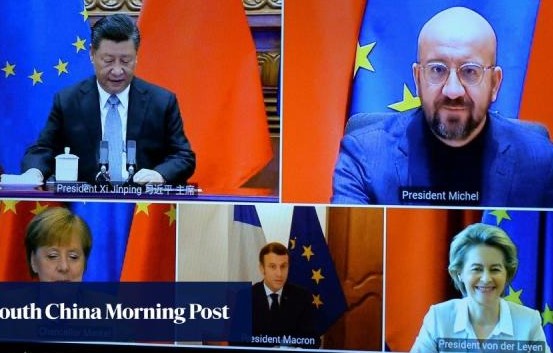FOR THE FIRST TIME, CHINA HAS ALSO AGREED TO AMBITIOUS PROVISIONS ON SUSTAINABLE DEVELOPMENT, INCLUDING COMMITMENTS ON FORCED LABOUR AND THE RATIFICATION OF THE RELEVANT INTERNATIONAL LABOR ORGANIZATION (ILO) FUNDAMENTAL CONVENTIONS
The European Union (EU) and China have concluded, December 30, 2020, in principle the negotiations for a Comprehensive Agreement on Investment (CAI). This deal follows a call between President Xi Jinping and European Commission President Ursula von der Leyen, European Council President Charles Michel and German Chancellor Angela Merkel on behalf of the Presidency of the EU Council, as well as French President Emmanuel Macron.
- China has committed to a greater level of market access for EU investors than ever before, including some new important market openings.
- China is also making commitments to ensure fair treatment for EU companies so they can compete on a better level playing field in China, including in terms of disciplines for state owned enterprises, transparency of subsidies and rules against the forced transfer of technologies.
- For the first time, China has also agreed to ambitious provisions on sustainable development, including commitments on forced labour and the ratification of the relevant ILO fundamental Conventions.
- The Agreement will create a better balance in the EU-China trade relationship.
- China now commits to open up to the EU in a number of key sectors.
“Today‘s agreement is an important landmark in our relationship with China and for our values-based trade agenda. It will provide unprecedented access to the Chinese market for European investors, enabling our businesses to grow and create jobs. It will also commit China to ambitious principles on sustainability, transparency and non-discrimination. The agreement will rebalance our economic relationship with China,” said President of the European Commission, Ursula von der Leyen.
The rules negotiated in this Agreement set a high benchmark in terms of transparency, level playing field, market access commitments and sustainable development. The EU’s work on planned autonomous measures in areas such as subsidies or due diligence will continue as a matter of priority.
This conclusion in principle of the negotiations is a first step in the process. Deliberations for the adoption and ratification of the agreement are yet to take place and will be conducted in full transparency.
The Comprehensive Agreement on Investment (CAI) will help to level the playing field for EU investors by laying down very clear rules on Chinese state-owned enterprises, transparency of subsidies, and prohibiting forced technology transfers and other distortive practices. The agreement also includes guarantees that will make it easier for European companies to obtain authorisations and complete administrative procedures. It also secures access to China‘s standard setting bodies for European companies.
Embedding sustainability in investment relationship
The CAI will also bind the parties into a values-based investment relationship underpinned by sustainable development principles. For Europe views: « This is the first time that China agrees to such ambitious provisions with a trade partner« .
Amongst others, China is undertaking commitments in the areas of labour and environment such as not to lower the standards of protection in order to attract investment, to respect its international obligations, as well as to promote responsible business conduct by its companies.
China has also agreed to effectively implement the Paris Agreement on climate change as well as to effectively implement the International Labour Organisation Conventions (ILO) it has ratified.
China has also agreed to make continued and sustained efforts to ratify the ILO fundamental Conventions on forced labour.
Sustainable development matters will be subject to a solid enforcement mechanism by an independent panel of experts as in other EU trade agreements. This means a transparent resolution of disagreements with the involvement of civil society.
The Agreement also creates a specific working group to follow the implementation of sustainable development related matters, including on labour and climate.
The package deal includes a commitment by both sides to try to complete negotiations on investment protection and investment dispute settlement within 2 years of the signature of the CAI. The common objective is to work towards modernised protection standards and a dispute settlement that takes into account the work undertaken in the context of UNCITRAL on a Multilateral Investment Court.
The EU‘s objective remains to modernise and replace the existing Member States’ Bilateral Investment Treaties with China.
Next steps…
Both sides are now working towards finalising the text of the agreement, which will need to be legally reviewed and translated before it can be submitted for approval by the EU Council and the European Parliament.
(Source: EU and China reach agreement in principle on investment (europa.eu)
